Are you considering moving to Buenos Aires?
This South American metropolis is has long been a popular destination for expats, immigrants and wanderers.
And as the digital nomad lifestyle has boomed in recent years, Buenos Aires has become a haven for nomadic workers and long term travelers.
I’ve been living in Buenos Aires for more nearly 15 years now and while it’s not always been easy, I’m so happy to be living in Argentina.
I moved here single and in my twenties. I traveled and partied and transitioned to a mellow late-thirties (and now entering mid-life 40’s) married life with kids.
As far as life as an expat in Buenos Aires goes, I’ve done it all. And I have used all of my experience to write this guide.
This post will help you with all of the logistics from immigration to health care, allowing you relocate to Buenos Aires with confidence.
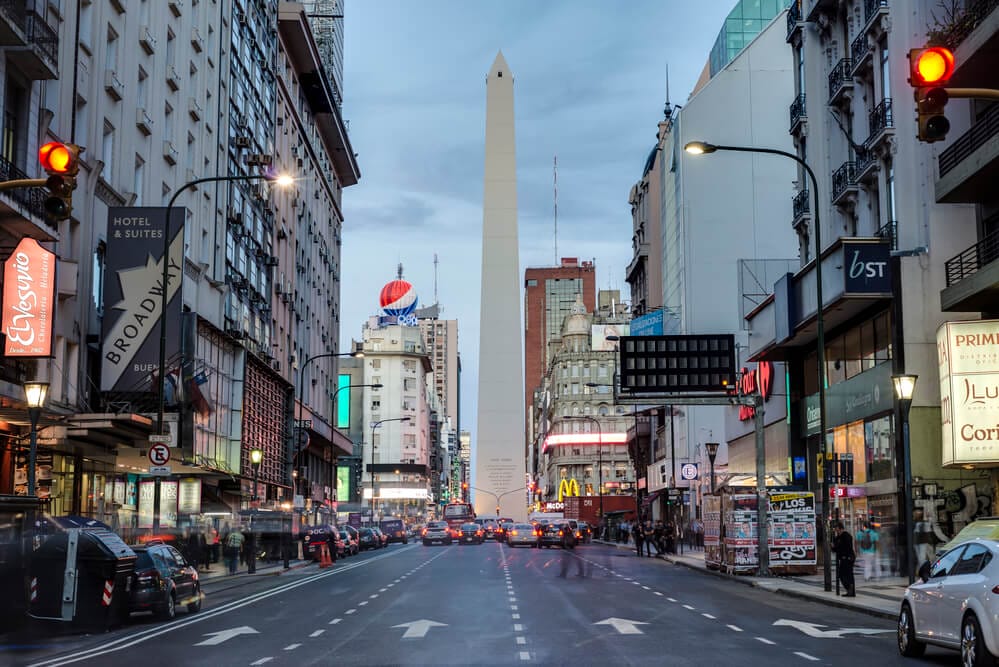
QUICK NOTE: This post contains affiliate links and Sol Salute may receive a commission for purchases made through these links, at no extra cost to you.
Living in Buenos Aires: A Complete Expat Guide
Buenos Aires is a massive city and home to a large expat community, burgeoning culinary scene, lively nightlife, and countless cultural offerings.
But is moving to Argentina a good idea?
That depends on who you ask.
Buenos Aires offers its own laundry list of challenges, just like any major city.
And honestly, it’s just one of many great places to live in Argentina.
I’ve been living in Buenos Aires as an expat for more than 15 years and my feelings about the city have been a roller coaster, ranging from love to loathing.
Contemplating moving to Buenos Aires?
Keep reading for a complete guide with my personal advice and tips to make that move as close to love and as far as away from loathing as possible.
Manage Expectations: Is Buenos Aires a Good Place to Live?
First and foremost, come with the proper expectations about the reality of expat life here.
Daily life in the U.S. and North America, in general, is very comfortable.
Things are efficient, friendly customer service is a priority, and everything is built and designed for comfort and ease from free 2-day (often same day!) shipping to central air conditioning.
Life in Buenos Aires can feel challenging on those fronts.
Efficiency?
What’s that?
Prepare to be challenged.
And that’s supposed to be the joy of moving to a new country, isn’t it?
While the day-to-day conveniences may not be as easy here, the big things are much more within reach.
Fantastic healthcare is available for all, regardless of income or immigration status.
I really enjoy public transportation (which is nonexistent where I’m from).
Relationships are a priority over work and meals with friends and family go on for hours.
And wine is very, very cheap (that alone is worth a move, right?).
So if you move to Argentina and you’re angry that you can’t find good oat milk or affordable feta, focus on the good and you’ll do just fine.
For more, read my living in Argentina pros & cons list.

Cost of Living in Buenos Aires
Due to a notoriously volatile economy, the cost of living in Buenos Aires can vary largely depending on the year and on whether you earn pesos or dollars.
At the moment (2025) it isn’t as cheap as it was in recent years, it’s downright expensive. With new monetary regulations and big changes from the current president, prices have been on the neverending rise. Regardless of these changes it is still livable for those earning dollars or another foreign currency. But those who earn pesos on a local salary will have a much harder time.
Rent for one-bedroom apartments typically run around $500-1000 US a month, but recently I’ve heard complaints from friends who have had a hard time finding larger apartments for under $2,000 US.
So families who need more bedrooms may have a harder time finding affordable rent, but solo expats or couples should be fine.
And hey, I realize that’s not as cheap as you might be expecting, but temporary rentals of furnished apartments are not the same here as long term, unfurnished rental contracts, more on that later…
My monthly premium for private health insurance costs me $220 US a month at the moment to cover me and my two children. For a note on price increases since Milei took office, this is more than double what I paid before he took office (which was $80 US).
Groceries aren’t as cheap as they once were but compared to the US they are still a bargain.
Expect to spend about 20-30 dollars on a dinner out including a bit of wine, for example. My supermarket hauls tend to run around $100 US for the basics for our family every two weeks (excluding meat and vegetables which I purchase at mom and pop shops).
Dining out varies. Nicer restaurants are on par with US prices. Smaller bodegones and local haunts are much cheaper. It depends on your taste but do expect to dine out less than you expect this year.
Read More: Currency Exchange in Buenos Aires & The Blue Dollar
Opening a Bank Account in Buenos Aires
To my knowledge, it’s very hard to open a bank account with your foreign passport.
You need to be a permanent resident with a DNI or a citizen of Argentina.
If you’re banking from back home (I still keep all my money in my US account), choose a bank that will refund ATM fees like Charles Schwab or Fidelity. ATM fees can be as high as U$10 per transaction.
An alternative to a bank account → Once you have a DNI you can open up a MercadoPago account. MercadoPago is similar to PayPal and can help with small things you’d otherwise need a bank account for.
For example, I deposit money into my MercadoPago account via Rapipago (mentioned later in this article) and use it for transferencias.
These bank transfers are a very common way to pay for just about anything in Argentina and for me, were the main incentive to open a bank account until I started using this app instead.
With virtual wallets becoming the norm, other apps are popping up all over the place. MercadoPago is still the largest. Modo is nipping on its heels and worth using as well, as they offer their own discounts at supermarkets, restaurants, and pharmacies.
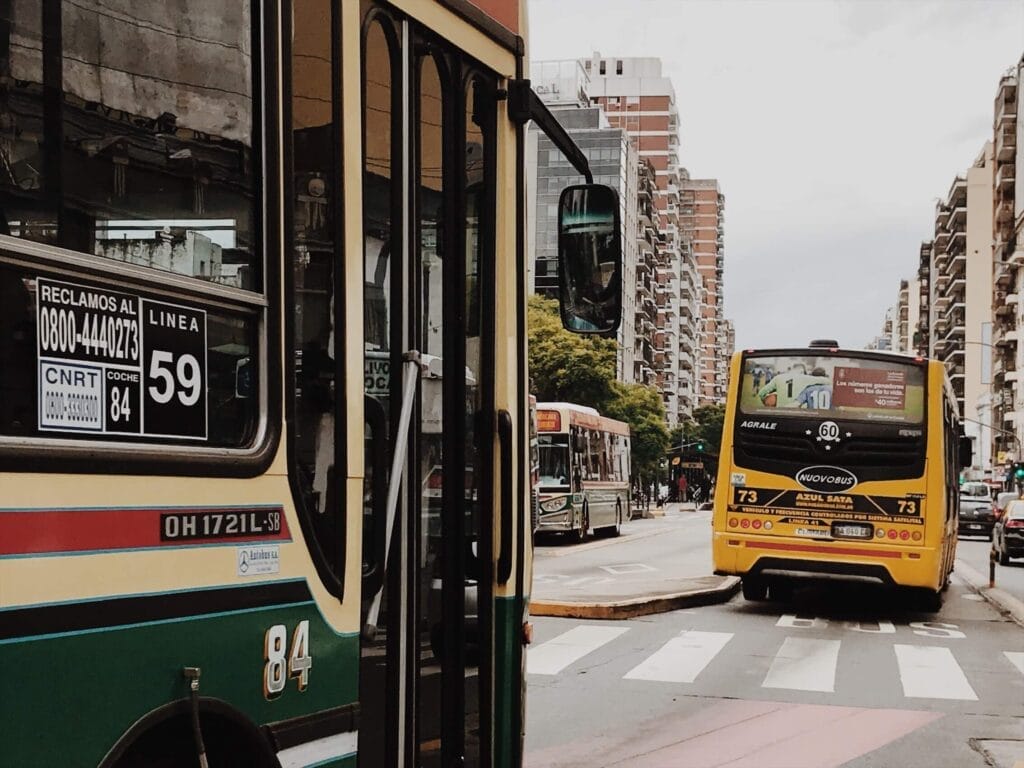
Public Transportation in Buenos Aires
Getting around Buenos Aires is very easy (and cheap) with public transportation.
You definitely do not need your own car here.
Don’t worry about importing yours or buying one (unless you work for the embassy and can bring your car in hassle-free and tax-free, then lucky you).
Driving in Buenos Aires is like an Olympic sport and is not for the weak of heart.
But don’t worry, between ride-sharing apps, taxis, and public transportation, you don’t need your own vehicle.
You have to have a SUBE transport card to pay for most forms of public transport. The SUBTE (metro system) is the only exception as it has been updated to accept payments with credit cards or virtual wallets directly on the turnstyle.
You can purchase a SUBE in any subway station and in some kioscos throughout the city.
Load cash onto the card at subway and train stations and some kioscos (it can be a matter of checking in a few of them until you find one that offers the service). Then you’re good to go for train, bus, and subway.
Rides cost around $900 pesos (subte) to $450-650 pesos (bus) as of May 2025.
Taxis are plentiful in the street, as are ride-sharing apps.
Uber is popular and easy to use. I also recommend using Cabify for an another option (use ERINM7 to get credit towards your first ride).
Use Waze or Google Maps to navigate the city on foot or via public transport.
Read More: How to Conquer Buenos Aires Public Transport Step by Step


Argentina Immigration Requirements
Argentina has relaxed immigration laws.
Better put: Argentina has very relaxed immigration law enforcement.
I lived here for two years before I even had a legal residency and this is a huge draw for many.
Argentina is a very easy country to live in without the proper paperwork.
Here’s a breakdown of the infamous “Colonia runs”, overstay fines, and more.
Digital Nomad Visas
After the big you know what of 2020 and the rise of Digital Nomads, Argentina jumped on the digital nomad visa bandwagon.
But is it worth it?
You be the judge.
Click here to read the requirements and apply.
You have to detail your plans, submit a CV, your passport, a photo, and proof of your work (a work contract, proof of your earnings etc).
The digital nomad visa is good for 180 days. The short time frame boggles me a bit. Most tourists can be in Argentina legally for that same time frame with zero bureaucracy.
On this page it states that you can renew it for an extra 180 days, which does make it a bit more tempting, if true and easy.
To be honest, for all that work I’m not sure if it’s worth the hassle.
What they’re asking for is technically straight forward but never has Argentine bureaucracy been easy for me.
The tourism board has created this helpful guide for digital nomads, which isn’t a legal visa in any way but it is a helpful initiative.
Colonia Visa Runs
Colonia, Uruguay is just across the river, close enough for a Uruguay day trip and a new stamp in your passport.
I was guilty of a few (a lot) of these runs myself back in my day.
But to refer to them as “renewing your tourist visa” is erroneous.
Just like most countries, when you enter Argentina, you receive a stamp in your passport that allows you to remain in the country as a tourist for 90 days.
Technically you can renew this once more to stay in the country for a maximum of 180 days as a tourist per year.
This is the same in most countries, like the United States. But unlike the US, it isn’t strictly enforced here.
It’s recommended to avoid these visa runs which can insult immigration officers.
If you plan on staying longer 90 days, even immigration lawyers will recommend that you overstay and pay the fine instead of doing repeated border runs.
My personal recommendation is – which is not valid legal advice – if you do choose to take the visa run route because you plan on traveling quite a bit, vary your trips up. Take advantage and travel across South America.
Visit Chile, Brazil, Paraguay, etc., rather than going to and from Colonia every three months.
This is better for you (you’ll get bored of Colonia quickly), and the border agents in Colonia grow very tired of this habit.
Grumpy immigration agents are sick of foreigners abusing the system and they can very well deny you entry or (most likely) threaten that this will be the last time they let you back in.
Overstay and pay the fine
If you’re planning on staying in Argentina for an extended amount of time, the best route is probably to overstay your visa and pay the fine on your way out.
You’ll avoid interactions with immigration agents who could deny you re-entry.
While overstaying you won’t be considered illegal.
Your residency status will be classified as “irregular” and you aren’t risking arrest by overstaying.
To find out where to pay the fine and how much it currently is, check the official immigration site here.
As of August 2024, it costs $40,000 pesos for non-Mercosur residents, click here for the fees.
This fee in particular is called the habilitacion de salida and is titled “habilitación de documentación al solo efecto de hacer abandono del país de extranjero residente irregular” on the table (yes, that IS confusingly long).
They list the cost as UMSM, a unit that is worth $1,000 pesos so 40 UMSM= 40,000 pesos (yes, that IS unnecessarily confusing).
Prórroga
If you feel uneasy with the previous two options, consider applying for a prórroga, or an extension of your tourist visa for another 90 days.
You can’t apply until within the ten days leading up to the expiration of your tourist visa.
Bring your passport, payment for the fee (currently $20,000 pesos as of August 2024), and your visa (passport with stamp) to the immigration office in Retiro (Av. Antártida Argentina 1355).
No appointments are given.
Show up early (this service is allowed from 8 am-2 pm, but show up at/before 8) and allow between 1-4 hours.
For full information, read the official site here.
If you’ve overstayed your visa, you cannot apply for a prórroga extension, you’ll have to pay the habilitación de salida (overstay fine, see above).
You cannot apply for multiple extensions, you get one (since legally you can remain in the country for the length of two 90 day visas per year).
Illegal vs. Irregular Status
In Argentina, overstaying your visa doesn’t mean you are in the country illegally like it does in the US.
Instead, you will have irregular immigration status.
No aggressive immigration agent will hunt you down to deport you.
You’ll need to pay the fine on your way out, that’s it.
Now, whether you are allowed back into Argentina or not depends on the mood of the agent at the time.
There are horror stories of frustrated agents threatening that the tourist won’t be allowed back in after multiple overstays/visa runs.
However, I haven’t heard of people actually not being let back in.
Usually, an apology, proof of a return flight leaving Argentina, or a promise to seek a legal residency are enough to get you through the door.
In summary, I don’t feel comfortable putting the advice to disobey a country’s immigration laws into writing.
Every situation is different, but I can write that it’s common, that I did it for two years, and I don’t believe the practice will end any time soon.
Permanent & Temporary Residencies
If you’re lucky to come with a job sponsoring your visa, or you find that unicorn of a job after arriving, you’ll receive temporary residency.
You can renew this each year and after three years of renewals, you’ll be eligible for permanent residency.
I received permanent residency after marrying my Argentine husband, and the process was very simple.
For more information about residency, requirements, and to make an appointment, click here.
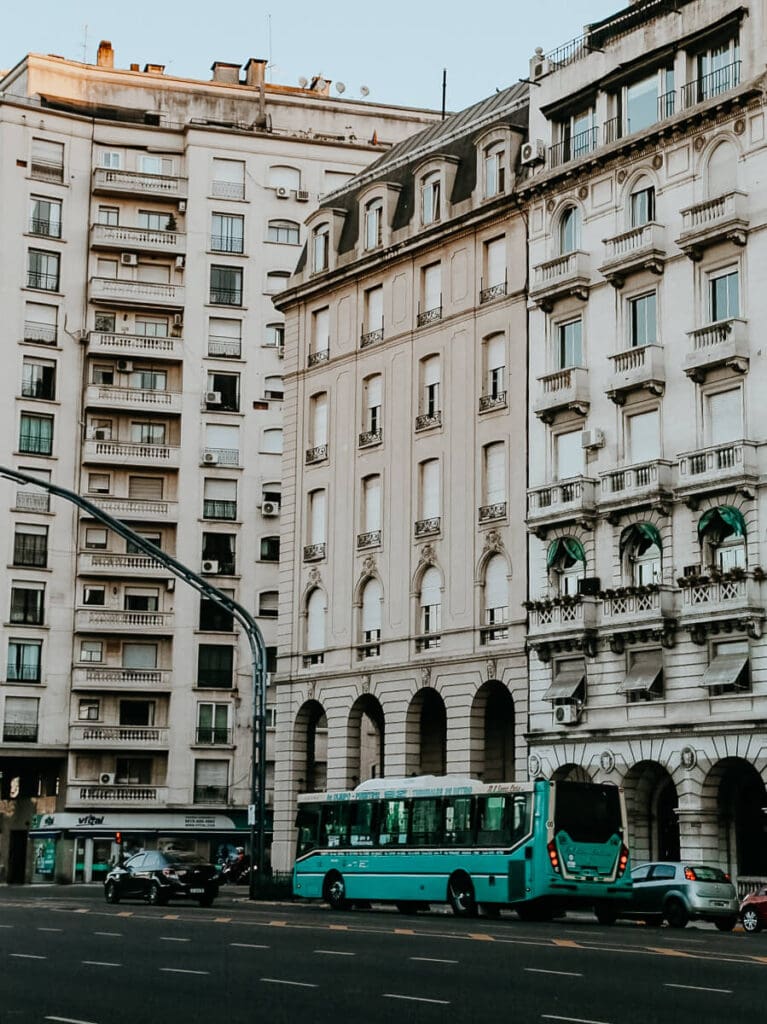
How to Rent an Apartment in Buenos Aires
If you’ve decided to move to Buenos Aires, the first thing on your to-do list is probably to find a place to live.
Apartment hunting in Buenos Aires can be confusing at first so here’s a quick guide to get you started.
Rental Agreements & Contracts in Buenos Aires
There are two types of rental contracts: temporary or con garantia (with a co-signer).
- Temporary contracts last for 6 months, are furnished and are priced in USD.
- Garantia contracts last for two years, are unfurnished and are priced in pesos (usually with a set adjustment for inflation every 6 months). The catch? You need a “garantia”, or someone that owns property in Buenos Aires willing to co-sign for you. They’d be signing that they’re responsible for your debt if you fail to pay rent. So, unless you have family in town, you probably will be renting with a temporary contract.
House Hunting Tips
Now that you know what you’re looking for, here are some tips and advice on where to look:
- What’s an ambiente? Rather than be described as 1 or 2 bedroom units, apartments are listed by the number of ambientes they have, including the living room in this number. So a monoambiente is a studio apartment and a 2 ambientes is a one-bedroom.
- Reach out to Airbnb rentals and ask if they’ll consider a long-term contract.
- Paying big deposits by bank transfer is very common in Argentina. I do it all the time, even car rentals and hotel stays. Renting direct from an owner will probably involve you wiring money into their account, it’s normal.
Where to search for an apartment:
- Airbnb – Rent a place to have a home to land in when you arrive, just for a month. If you like it maybe they’ll rent long term for a better price.
- Zonaprop
- Solo Dueños
- Facebook groups
- AlquilerArgentina.com – Like a local Airbnb, prices are in pesos. But you’ll have to do it like the locals do – by messaging with an owner back and forth on WhatsApp and probably making a hefty deposit via a wire transfer into their account.
Where to Live in Buenos Aires: Neighborhoods
Wondering which neighborhood to live in?
I have a complete guide here on where to stay in Buenos Aires as well as this complete neighborhood guide.
They’re written for tourists and travelers looking for hotels, but are still a great breakdown on neighborhoods for future expats as well.
Most neighborhoods are safe for expats to live in, but if you are particularly concerned about safety in the city, read my guide that answers the question is Buenos Aires safe.

International Schools in Buenos Aires
If you’re moving to Buenos Aires with your family in tow, their education must be at the top of your worries.
Luckily, there are a lot of options for you here.
There are a lot of bilingual and international schools in Buenos Aires for you to help your child ease into life here.
Most are in English, but there are also schools offering classes in German, French, and on it goes.
Whatever your child needs, you’ll surely find it here.
For everything you need to know when choosing a school in Buenos Aires, read my guide to international schools in Buenos Aires.
Pago Fácil: How to pay your bills
Pago Facil and Rapipago are the top two ways to pay your bills.
However, I’d say they’re anything but facil or rapido and are actually a bit stuck in the past.
But what can you do, cash is king in Argentina, and that’s how most people prefer to pay their bills.
If your apartment agreement requires you to cover your bills, you’ll likely need to bring them to either Pago Fácil or Rapipago, where they’ll scan the bar code and you can pay by cash or credit card.
You can also pay a lot of online purchases (even with airlines like FlyBondis) this way as many online storefronts offer this option at check out (usually via MercadoPago).
It’s something to consider if the website rejects your foreign card or you’d prefer to use cash.
Read all about the dollar blue and exchanging money in Argentina here.
Apps like MercadoPago make it easier to pay for certain things online or with a card (when they would normally only accept cash).
Side note that you need a DNI to open a MercadoPago account but once you can do so, it is a game changer.
For more, read my post all about the best apps to download in Buenos Aires.
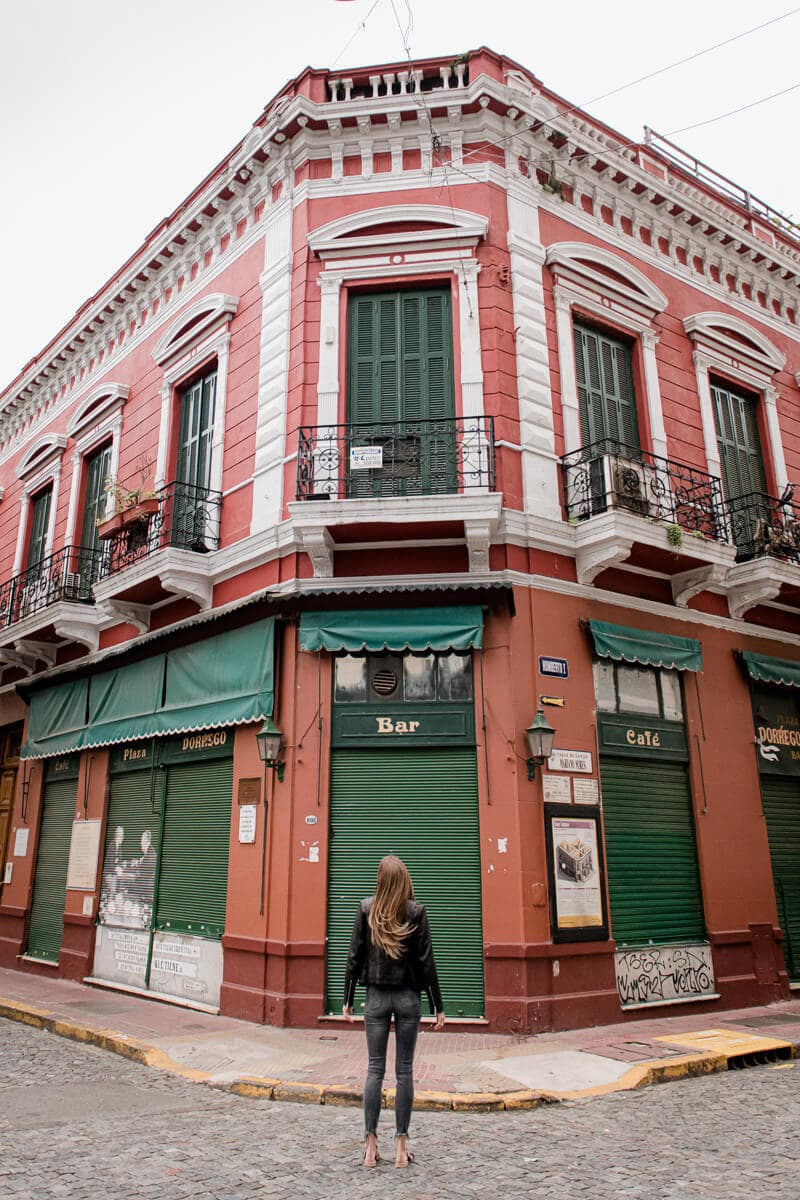
How to get Health Insurance in Buenos Aires
There is excellent public healthcare in Argentina.
The care you’ll receive from the doctors in public hospitals is equal to that in private clinics.
The difference is in the wait times and quality of infrastructure. These hospitals are underfunded and overloaded.
If you’re in a bind financially, you can and should feel comfortable turning to public healthcare here.
However, if it’s within your budget, private healthcare options are abundant and affordable.
Also, as of May 2025 Milei is planning on charging non-citizens and non-residents for healthcare and hospital visits.
The gist of it is – come with some sort of healthcare in place.
If you want a local healthcare plan, you don’t even need to have legal residency to sign for a private plan (I signed up on an expired tourist visa after living here for a year).
If working here, most jobs will include insurance in their benefits packages, covering a large portion of your premium.
But if you don’t have a job, it’s not expensive to pay out of pocket, I do so as a freelancer.
To be expected, the younger you are, the cheaper your premium will be and it includes so much.
My insurance covers 40% of all prescriptions, 100% of any blood tests, scans, or ultrasounds (preventative care is encouraged), dental is covered 100%, and so on. And that’s with the cheapest plan available on Swiss Medical.
Top Insurance Companies:
- OSDE
- Swiss Medical
- Hospital Aleman – If you find yourself sick and looking for a one-off doctor’s appointment to pay out of pocket for, the German Hospital is great for this. They offer insurance plans also, but I’d stick with OSDE or Swiss for that since they have a wider network of clinics and hospitals to choose from.
SafetyWing Travel Insurance
SafetyWing offers travel health insurance tailored to both travelers and digital nomads.
If you’re moving here to test the waters, I recommend SafetyWing’s Essential Plan. It covers emergency medical coverage for unexpected illnesses or accidents, medical evacuation & repatriation, and trip coverage (for delays or lost luggage). They offer add-ons for adventure sports and electronics theft.
If your lifestyle is travel, get their Complete Plan. This plan covers everything the Essential Plan does along with routine check ups, mental healthcare, and even maternity care. It will cover all of your bases and remove any obstacles on arrival.
If you want a plan to cover you from the moment you arrive in Argentina and then as you move from country to country, there is no better option to keep you healthy and safe.
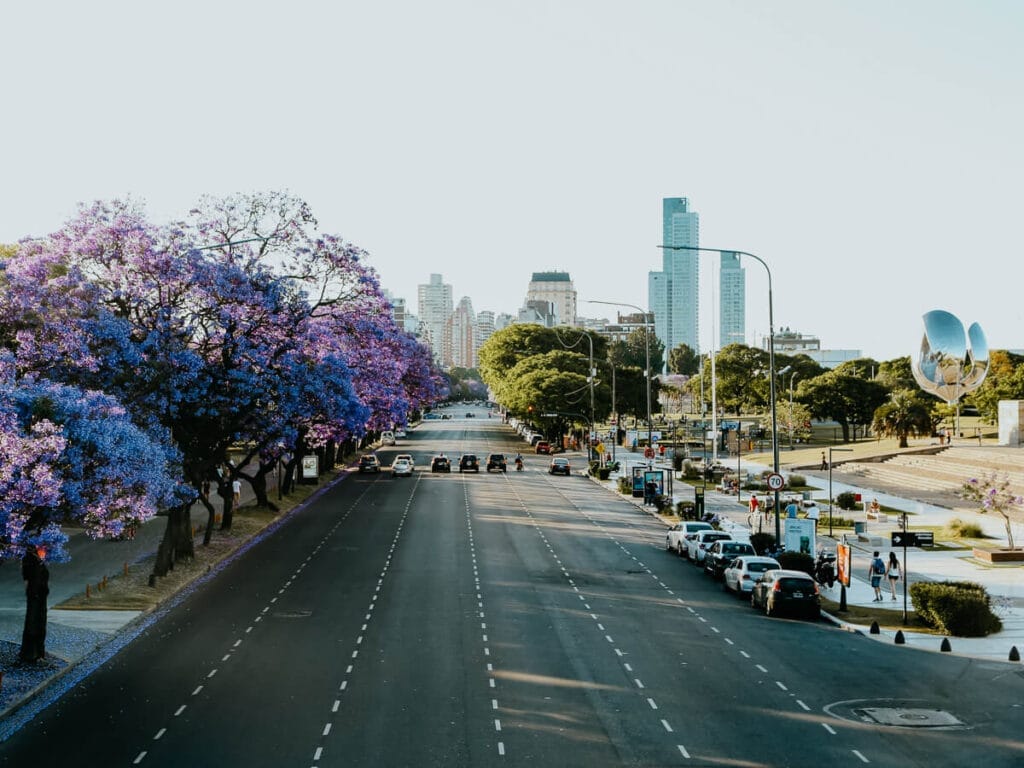
Packing List: What to Bring to Argentina
What to bring to Buenos Aires, you ask?
Everything but the kitchen sink.
Ha, kidding, sort of, not really.
Shopping in Buenos Aires can be a challenge.
I used to have a short section here on what to pack, but I recently wrote a complete guide because it really is a big topic.
READ IT HERE → What to pack for a move to Argentina
And for more packing and shopping tips, read the following:
- Argentina packing list – This one is a vacation packing list but still helpful
- Shopping in Buenos Aires Guide
- Leather Shopping Guide

Where to grocery shop in Buenos Aires
Supermarkets in Argentina are underwhelming, to say the least.
There’s an entire aisle dedicated to different brands of plain crackers, and the condiment aisle is 75% mayonnaise.
Imports are expensive, there is little variety, and Argentines, as a rule, aren’t really into spicy food.
But that doesn’t mean you can’t get good quality ingredients, you just need to know where to shop.
Small neighborhood shops trump chain supermarkets, nearly every time.
While the internet has slowly killed the mom-and-pop shop in the US, they’re alive and thriving in Argentina.
I only shop in the chain supermarkets for dry goods like canned goods, dry pasta, canned tomato, cleaning products, and the like.
How to Shop Like a Local in Buenos Aires
If you know you’re not going to be cooking much at home, then this all may be irrelevant to you.
But if you fancy yourself a self-taught chef and want a fully stocked kitchen, this is where I’d do my shopping:
- Small neighborhood shops such as Granjas (poultry and eggs), Carniceria (butcher shops), Verdulerias (best produce around), Casas de Pasta (house made fresh pasta shops), Fiambrerias (charcuterie shops), and so on.
- Chino supermarkets: These small supermarkets are the cheapest places to buy wine. You’re welcome
- Ferias Itinerantes/Neighborhood Weekly Markets: These markets rotate and move neighborhoods each day. They’re a government initiative to offer good quality at affordable prices to help fight inflation. They have great produce, meat, eggs, and meats and cheeses at low prices. Check here to find one near you.
- Barrio Chino: Chinatown in Belgrano is small (only four blocks) but it’s the best place to get imported goods, hard to find ingredients, and cheap bulk products (like rice, seeds, nuts, and quinoa).
- Bolivian Market in Liniers: It’s a trek to get to Liniers, but I think it’s worth it if you’re up for an adventure. There’s a lot of variety and it’s very, very affordable (even more so than Chinatown). I go here and stock up on things like quinoa and chia seeds to last a couple of months. Take advantage and eat some amazing Bolivian food while you’re there, you won’t regret it.
Read More: What to Eat in Buenos Aires: Food Experiences & Tours
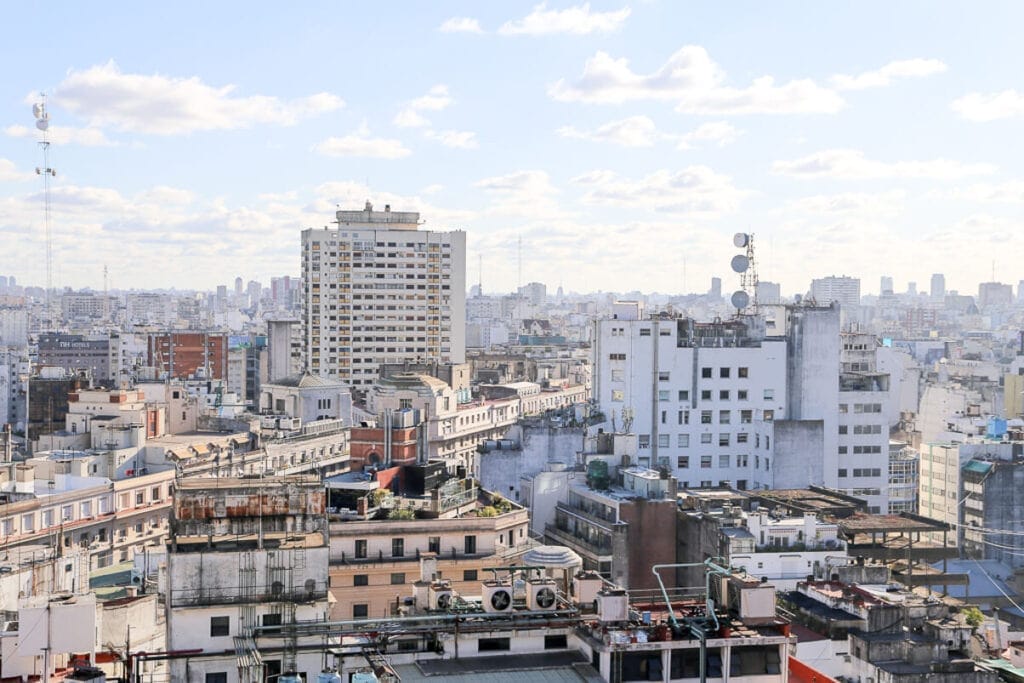
Argentina Travel Resources
- BOOK A CONSULTATION | I offer one-on-one travel consultations to help you plan your trip to Argentina. Pick my brain to get a local’s insight. Click here for more information.
- MY MAP | Buy my interactive map with 300+ pins to have access to the city as I see it. It is an invaluable resource. See more here about how it works.
- AIRPORT TRANSFERS | Having a driver waiting for you is ideal for a stress free arrival, Cesar and his team here is the best option for a driver from Ezeiza or Aeroparque, they are my go-to airport ride!
- TRAVEL INSURANCE | Always travel insured. Anything can happen anywhere and it is scarier and costlier in an unfamiliar country. SafetyWing’s Essential Plan covers unexpected travel and medical emergencies and even offers add-ons like electronics theft or adventure sports. It is the best if you’re coming on vacation. If you’re coming as a digital nomad or an extended stay, you need their Complete Nomad Plan which also covers routine check ups, maternity, mental healthcare and more. Read more: Health Insurance in Argentina
- PHONE PLAN | These days, traveling with data is essential. Especially in Argentina where everything is managed on Instagram and WhatsApp. I recommend this E-SIM card. It’s hassle-free and affordable, for more read how to get an Argentina sim card.
- ACCOMMODATION IN ARGENTINA | booking.com is the most common hotel site used in Argentina and it’s where you’ll find the most options.
- RENTAL CARS | I love using Discover Cars, it is a great platform to compare different rates and providers and I find they have responsive customer service.
- BUS TICKETS | Check Busbud for long distance bus routes and tickets.
- VPN | If you’ll be using a public WiFi connection and want to secure your data, I highly recommend using a VPN, I personally use and have had a good experience with ExpressVPN. I also use it to access Hulu and American Netflix from Argentina.
- FLIGHTS | Always check Google Flights and Skyscanner for flights to and within Argentina. Aerolineas Argentina is the local airline with the most routes. FlyBondi and Jetsmart are two budget airlines with dirt-cheap prices (but expect to pay for every add-on like luggage).
Online Resources
Want to meet fellow expats?
There are a few great communities out there in the form of Expat Forums and Facebook Groups.
Looking for reasons not to move to Buenos Aires, reason TO move to Buenos Aires, or the pros and cons of expat life from those in the thick of it?
Check out the following links:
- Buenos Aires City Guide
- Argentina Travel Tips: I run this Facebook group for travelers in Argentina looking for advice when planning travel here. I’d love to have you there! Join here.
- Buenos Aires Expat Forum
- MercadoLibre – The eBay of Latin America, you can buy and sell anything you’re heart desires on MercadoLibre.
- Buenos Aires Expat Hub – A very helpful community on Facebook
- Lil’Portenos: This website is a directory of everything you need to raise a little one here in Buenos Aires.
Argentina Travel Tips Facebook Group
Do you have any particular questions about your upcoming trip or move to Argentina? Looking for the best advice on where to go and what to do?
Join the Argentina Travel Tips Group on Facebook to get first-hand advice from me along with fellow travelers, tour guides, expats, and locals in Argentina.
Pin It For Later

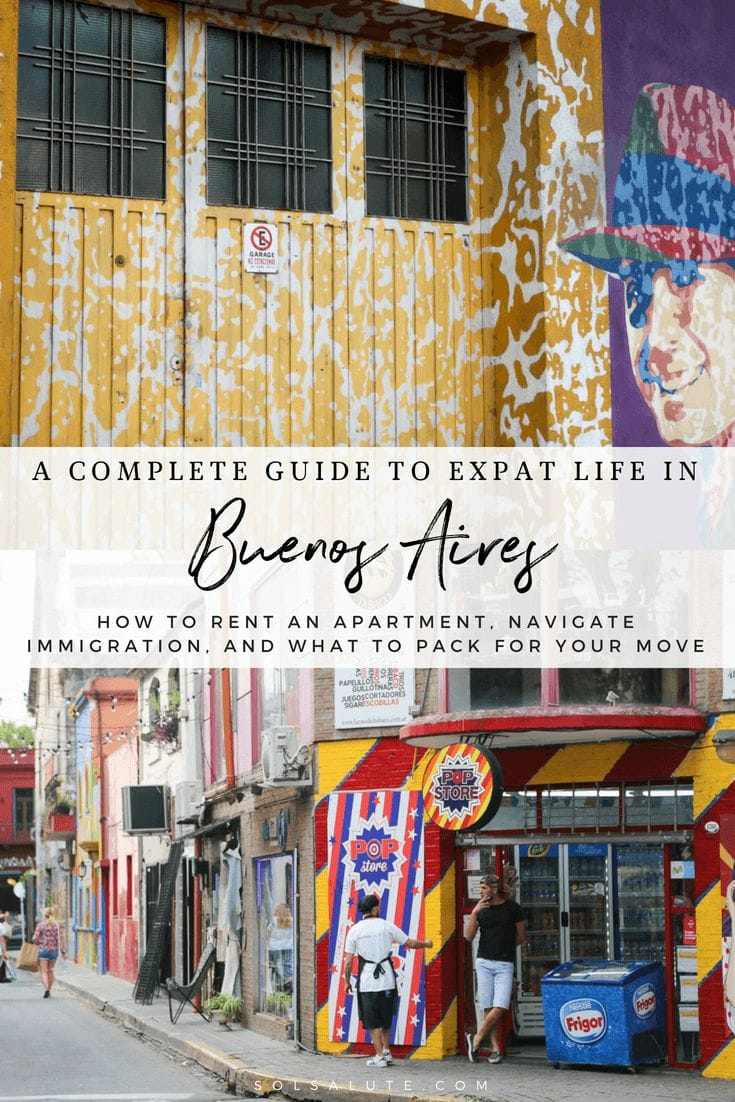




Great write-up. Very useful, thanks!
very helpful, nice concise job of walking the reader through a myriad of items. thank you for taking this time to do so !
Thanks so much Tomaso!
Is there a way to move to Argentina without a job? Ie. working remotely for an American company. Maybe like a long term tourist visa or something?
Hi Julia! There is no long term tourist visa, only the tourist visas I outline above. Good luck with your planning!!
What a great article! I’ve only scanned it quickly so far and have printed it out for closer study later. I’m retired and contemplating settling in Argentina, probably in about a year’s time when I’ve finished tripping around Southeast Asia. I’m particularly interested in the retirement visa. Many questions, but the first would be, is it ok to start the retirement visa application while in Argentina on 90 day tourist visa? Do you know of a non embassy source of retirement visa information? Thanks again for some great information.
Hi Bill!
Thanks for reading and your kind words! I’m sorry that I don’t have any experience with the retirement visa to give you reliable tips. I recommend checking out the BA Expat Hub on Facebook or the Buenos Aires expat forum website and searching "retirement visa" to get firsthand experiences and tips. I think you should be able to start the process here but I’m not sure and don’t want to give inaccurate advice.
Hi Erin,
Great, great article. You’re exactly the person I need to contact!
I’m Argentinean and have been living in NYC for the last 30 years.
I’m currently a professor at CUNY and my situation here is quite good.
Nevertheless I am also a famous musician in Argentina from work I did in the 70’s.
I will be turning 70 in 2020 and I’ve been dreaming about returning home!
I’m a citizen of Argentina and all my papers are current.
I could retire next year with a US $5,000 monthly income.
The question is how could I have access to my income since I would keep my bank account and all finances in the US.
I would be living as a "tourist" in terms of access to money but since I’m a citizen of Argentina (and the US) I wouldn’t have problems with visas.
I wish I could contact you personally! It’s a very emotional issue for me and I’m a bit in the dark regarding the logistics of access to money from the US.
I would greatly appreciate your opinion.
Thank you!
Gustavo
Excellent article, very helpful.
Interesting stuff. We are coming to BA for a month and will be renting an apartment. How hard is it to find an apartment with a washer/dryer inside the apartment? Most descriptions don’t say anything about laundry: is is in the apartment? The building? Nearby?
Apropos of that, is it easy to find a laundry?
It’s possible your Airbnb has a washing machine, they’re common to have inside apartments but I’d confirm before renting! Dryers are very, very rare. It’s more common to hang dry your clothes. Laundromats don’t exist in the way we know them, there’s no self wash. You can leave your clothes with a lavanderia to be washed and dried, it’s very cheap per load. I prefer to wash my own clothes because they use very hot temperatures and I’m picky about my clothes but it’s the most common way to get your laundry done here.
I apologize for my delay in responding, I’ve been ill this past week. Enjoy your month in Buenos Aires!
Hi, I was planning to move Argentina and I just got this article. It was very informative . Thank you. Can you suggest any firm to proceed my Argentina move.
Unfortunately, I’m not familiar with any firms to facilitate international moves. I recommend reaching out on the online forums I mention in the article for Expats in Buenos Aires, someone there must surely have one to recommend.
Great information! Thank you for taking the time to do this. Your blog has been extremely helpful.
Thank you!! I’m so happy to hear that it’s been helpful for you 🙂
Great article, FYI it doesn’t appear when I click "Destinations>Buenos Aires". This is exactly what I was looking for!
Wanted to ask: as someone who is looking for a 3-4BR in a nice Belgrano/Palermo/San Telmo area, everything I’m seeing seems to me that it’s fairly expensive. AirBnbs start at the $3k-$4k range (USD). Is this just because I’m searching in English? Are these the normal prices?
Thanks for the information!
Hi Kurt! I’ll change it now so it shows up under the Buenos Aires destination page and not only on the Expat page. Thanks!
Regarding the prices, yes that is very expensive! Prices are always going to be more expensive for a furnished unit in dollars, that’s true no matter where you’re from or where you’re searching from.
I just searched Airbnb (with my VPN set to the US) and found plenty of 3 bedroom houses and apartments in Palermo, Belgrano and San Telmo in the 1,000-1,800 dollar range, which is much more within reason. They’re definitely there!
Are you putting in the dates as a full month? That applies the month discount (different for each host) and greatly brings down the price. When in doubt, send an inquiry to the host and ask about monthly or long term stay discounts (they’ll surely be happy to oblige). Good luck!
Erin,
Wow! This info is just what I needed to help me navigate the city. I’m moving to BA from Waco, TX at the end of the month. My daughter also married an Argentine. Do I have any arrangements made as far as renting an apt.? Of course not!
Hi Sharon!! How exciting that you’re moving down here, I feel like I hear from SO many Texans doing the same thing. BA must be filled with us. Enjoy your new adventure 🙂
I was looking at internet speeds for Day Trading? I hear Buenos Aires has good internet? Is this true?
Hi Ari! Buenos Aires does have good internet, but not what you may be used to. And for what it’s worth, a friend of mine worked in IT and needed a constant internet connection so he got 2 connections in his house in case one failed.
Buenos Dias Erin!
Thank you for this AMAZING and COMPLETE article helping me to know more about Argentina.
In fact, I live in Geneva in Switzerland. I am planning to move to Buenos Aires to live and work as a pharmacist.
What will be yoour advice if you were in my situation? Are the pharmacies in Argentina independent or there are chain pharmacies (like big pharmacies)? Although I speak 7 languages, I have a level A2 in Espagnol, do you think that this might cause a block to realize my ambition?
thanks for any helpful comment.
Hi Chris! Thank you for your comment. Unfortunately, I don’t know what sort of requirements there are to become a pharmacist in Argentina if you are a pharmacist abroad. I would imagine Spanish is a requirement but perhaps there are also certifications? I have no idea, sorry. Good luck!
Stupid stupid question…..BUT, what type of visa would I need for the temporary contract. I’m planning on staying in Buenos Aires for 6 months after the quarantine; currently, I don’t possess any sort of visa, only my U.S. passport.
I’d love if you could point me out in the right direction!!!
Hi Jesse1 If you mean a temporary contract as in being sponsored by a job, that’s something your new job would take care of…
Wondering about access to local US televised sporting events (NFL, NHL, etc.) in Buenos Aires.
I recommend using a VPN, I use ExpressVPN, read about it and I have a link in this post:
https://www.solsalute.com/blog/apps-to-use-in-argentina
Otherwise, there are always bars and pubs in Palermo showing them when they’re really important and you can find out more when they happen on the expat Facebook groups.
Hey Erin, thanks for the great article about Buenos Aires. I saw in another comment that you have a friend that works in IT, I was wondering if you could describe more about what they do. I’m an engineer and was hoping that would be an option if I moved to BA. Thanks in advance!
Hi Jake! It was a friend who moved to Ireland two years ago actually. I know they worked in web development but not much else, good luck with your move!! Finding a remote job you can do from anywhere is always the best option though, as salaries abroad will always be better than locally.
Hi Erin! Thanks for the amazing article. I’m about to move to Buenos Aires in a few days and even though my boyfriend lives there, it’s extremely useful to read about your experience. I was wondering if you had any information regarding reliable/affordable phone services in Argentina. I will continue working for an American company and I need to make phone calls to US numbers pretty much every day. I contacted vonage but they just told me that they don’t offer any services outside the US. I would really appreciate any recommendations! Thank you!
Hello Shirley!! I apologize for the late response. Personally, I use Skype and have an American number that I can use to receive calls. I know another friend just used an international T-Mobile plan from the US. I hope you found a solution that works for you!
I identified with so much of what you said! I am from Ohio, USA and moved here to Argentina in 2011. I married my Argentine husband in 2012 and lived in Capital for 5 years before moving to Pilar (north zone). I would love to share stories with you (and the others in the comments)! My email is Tr***********@*****il.com
Oh Tracy it sounds like we have a lot in common, I’ll email you now.
For the man wanting to know about working in IT from the United States, I read the Argentine government is considering a new kind of visa for people who want to travel for work and be able to stay longer than the usual visitor visa allows. Perhaps check their website and see when and if this will happen (9/2022).
Hi!
Thanks so much for the article. I’ve been in BsAs since Sept. 5th and have overstayed my 90 day visa by 1 month so far. I plan on leaving in March for a bit. At this point, I’m just going to wait until I leave instead of trying to find a solution for my overstay.
In regards to the immigration portion of this article when you say “You’ll need to pay the fine on your way out, that’s it.” Does this mean I’d go to the airport on my departure flight and pay there or would I need to have it handled beforehand? If so, where? Thanks so much!
Hi Natasha! You can do it before (for peace of mind) or at the airport on your way out. If you do that, give yourself time for lines just in case. You need to go to the window for migraciones, they’ll print a ticket for you to take the Banco de la Nacion where you’ll pay the fine then you need to go back to migraciones to show payment. It’s easy but can take time. Do this all before checking in for your flight (they won’t let you check in otherwise). Otherwise you can do it ahead of time, Aeroparque has an office you can do it or downtown in the main migraciones office (always an experience haha)
https://www.argentina.gob.ar/interior/migraciones/habilitacion-de-salida
I just want to add my gratitude to the long list of people who have found your site and have been able to take advantage of all the incredible insider information you offer, thanks to all your hard work and generosity of spirit. The Internet is full of so much ickiness, but then there are people like you, who overflow with altruism. Thank you, thank you, thank you. You give me hope for our species.
Thank you so much! This has to be the nicest comment this blog has ever received.
Hola, great article. I just moved here and you talk about immigration lawyers in your article. Do you happen to know a good one that understands & speaks english? Any recommandations? Thank you already so mucho in advance!
I’m sorry I don’t have any to recommend, but you can ask on the Facebook group Buenos Aires Expat Hub, it’s a helpful community.
Thanks for giving an amazing guide about Living In Buenos Aires, Argentina. I have got all the answers of my question related to this. This is very informative article.
Buenos Aires is a popular destination for expatriates seeking a unique blend of European charm and Latin American flair. Known for its rich culture, exquisite cuisine, and passionate tango dancing, Buenos Aires offers an exciting and welcoming environment for expats from all walks of life.
Hi, thank you so much for this information, I’m thinking of moving but I was just too afraid of leaving the U.S, but I think I know what to do now , I was wondering what’s the process with marriage in Argentina. My bf is from Argentina but we really don’t know where to start. Thank you again for all your tips.
Wow, what an insightful and comprehensive guide to living in Buenos Aires and making the move to Argentina! This article is a treasure trove of practical tips, personal anecdotes, and cultural insights that will undoubtedly be invaluable for anyone considering relocating to this vibrant city. Thank you for sharing such valuable information and inspiring others to embark on their own Buenos Aires adventure!